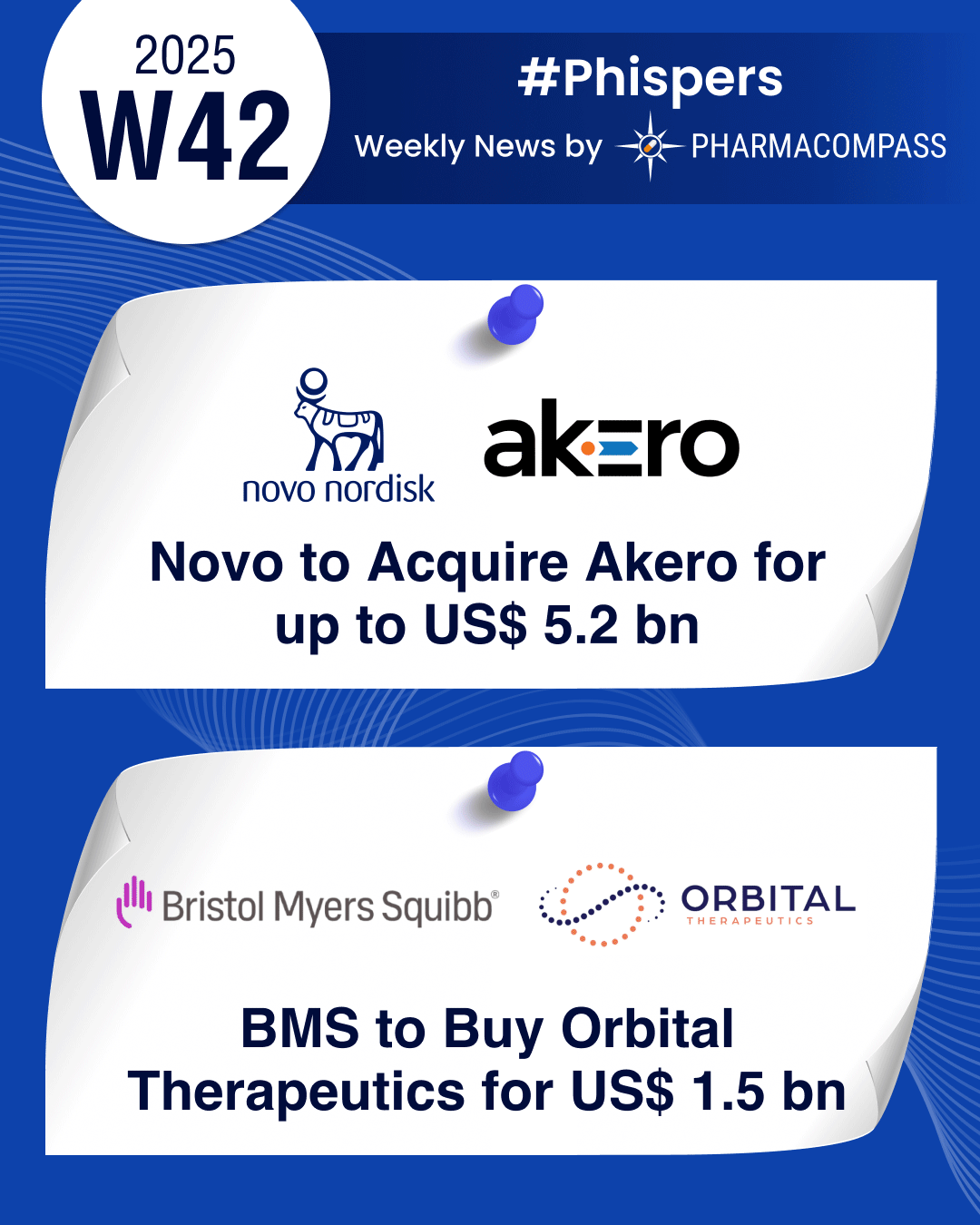
By PharmaCompass
2025-10-16
Impressions: 929 Article || 108 Video
In this week’s Phispers, Novo Nordisk and Bristol Myers Squibb (BMS) struck multi-billion-dollar acquisitions to expand their metabolic and cell therapy portfolios, respectively. Takeda deepened its AI-driven drug discovery collaboration with Nabla Bio to develop protein-based drugs. And Boehringer Ingelheim signed a licensing agreement with South Korea’s AimedBio to develop a potential best-in-class antibody-drug conjugate (ADC) therapy for cancer.
In approvals, the US Food and Drug Administration (FDA) approved Teva and Medincell’s Uzedy as maintenance therapy for bipolar I disorder and expanded the use of AbbVie’s Rinvoq for ulcerative colitis and Crohn’s disease. The agency also added a safety warning to Johnson & Johnson and Legend Biotech’s Carvykti.
In clinical trials, Pfizer reported promising results from its phase 3 HER2+ breast cancer study, raising hopes for a first-line treatment. And Eli Lilly’s experimental weight loss drug — orforglipron — showed superior blood sugar control in diabetic patients across two late-stage trials.
Meanwhile, several pharmaceutical companies announced plans to sell medicines directly to patients in the US and cut prices ahead of the planned launch of TrumpRx.gov in early 2026. Separately, US lawmakers revived a softer version of the Biosecure Act, which could reshape global biotech partnerships and benefit non-Chinese contract manufacturers.
Novo to acquire Akero for up to US$ 5.2 bn; signs up to US$ 2.1 bn licensing deal with Omeros
Novo Nordisk has agreed to acquire Akero Therapeutics, a South San Francisco-based clinical-stage biotech developing treatments for metabolic diseases, for up to US$ 5.2 billion. The deal includes an upfront payment of US$ 4.7 billion, with additional payments linked to Akero’s lead drug, efruxifermin, receiving an FDA approval by mid-2031. Efruxifermin is being developed to treat metabolic dysfunction-associated steatohepatitis (MASH), a serious liver disease linked to obesity and diabetes. Novo plans to advance the drug’s phase 3 trials and integrate it with its existing metabolic portfolio, including obesity drug Wegovy (semaglutide).
Novo also signed a licensing deal worth up to US$ 2.1 billion with American biotech Omeros for the latter’s experimental drug for rare blood and kidney disorders. Under the deal, Novo gains exclusive global rights to develop and commercialize Omeros’ drug zaltenibart.
BMS to buy cell therapy developer Orbital for US$ 1.5 bn; Takeda expands AI deal with Nabla Bio
Bristol Myers Squibb will acquire privately-held biotech Orbital Therapeutics for US$ 1.5 billion in cash. Orbital is working on in vivo CAR-T, a novel approach to treat autoimmune diseases. With this deal, BMS expands its portfolio and gains access to its lead candidate, OTX-201, designed to target autoimmune diseases. Unlike traditional CAR-T therapies made outside the body, OTX-201 works inside the body. The patient’s own body becomes the site of CAR-T cell generation, bypassing the need for external cell engineering.
Takeda expands AI drug discovery deal with Nabla Bio: Japanese drugmaker Takeda Pharmaceutical has signed a new multi-year partnership with US-based biotech Nabla Bio to use artificial intelligence (AI) for designing protein-based drugs. The agreement builds on a 2022 collaboration between the two companies.
Boehringer licenses cancer drug from AimedBio: Boehringer Ingelheim has signed a global licensing agreement worth up to US$ 991 million with South Korea-based biotech AimedBio to develop a potential best-in-class antibody-drug conjugate (ADC) therapy for cancer.
FDA expands use of Teva-Medincell’s Uzedy as maintenance treatment for bipolar I disorder
FDA has approved Teva Pharmaceuticals and Medincell’s Uzedy (risperidone) as a once-monthly extended-release injection for the maintenance treatment of adults with bipolar I disorder (a serious mental illness marked by alternating episodes of mania and depression). Uzedy, previously approved in 2023 for schizophrenia, is the first subcutaneous, long-acting formulation of risperidone.
Expands use of AbbVie’s Rinvoq: AbbVie’s Rinvoq (upadacitinib), an oral medicine for inflammatory bowel disease, has received FDA approval with a broader use. It can now be prescribed to adults with moderately to severely active ulcerative colitis or Crohn’s disease not only if standard treatments — known as TNF blockers (or drugs that reduce inflammation in the immune system) — don’t work, but also if doctors feel TNF blockers are not suitable for a patient.
Adds boxed warning to J&J’s Carvykti: FDA has added a boxed warning to J&J and Legend Biotech’s CAR-T therapy Carvykti (ciltacabtagene autoleucel), used to treat multiple myeloma. The warning highlights the risk of immune effector cell-associated enterocolitis (IEC-EC), a serious intestinal inflammation that can cause diarrhea, stomach pain, weight loss, and, in severe cases, bowel perforation or sepsis.
Pfizer’s drug shows promise as maintenance therapy for HER2+ breast cancer
Pfizer reported positive results from its phase 3 trial, testing oral drug Tukysa (tucatinib) as a first-line maintenance therapy for HER2-positive metastatic breast cancer. The study showed Tukysa significantly delayed disease progression or death while maintaining a tolerable safety profile. Currently approved for later-line HER2+ breast cancer, Tukysa could now move into early-line treatment, offering a chemotherapy-free maintenance therapy option to breast cancer patients.
Lilly’s orforglipron scores two trial wins in diabetes: Eli Lilly’s experimental weight loss drug — orforglipron — showed superior blood sugar control in diabetic patients across two late-stage trials. In one trial, the drug beat AstraZeneca’s Farxiga (dapagliflozin)at lowering patients’ blood sugar levels. In the second trial, it performed better than placebo on the same measure in patients who were also taking insulin.
Drugmakers expand direct-to-patient sales, offer discounts ahead of TrumpRx.gov launch
Several pharmaceutical companies are offering drugs directly to patients in the US and cutting prices, after Trump’s push to lower prescription costs and reduce middlemen like pharmacies and insurers. The US administration plans to launch TrumpRx.gov in early 2026, a website providing discounted medicines. AbbVie, Bristol-Myers Squibb, Eli Lilly, Novo Nordisk, Pfizer, Roche, Sanofi, and Zealand Pharma have announced initiatives, including discounted sales and direct-to-consumer shipping.
Astra joins TrumpRx program: British drugmaker AstraZeneca has reached an agreement with Trump administration to lower US drug prices and sell some medicines directly to patients through the TrumpRx.gov website. Eligible patients with prescriptions for chronic diseases could receive discounts of up to 80 percent off list prices.
Senate okays new version of Biosecure Act: The US Senate has approved a new version of the Biosecure Act that seeks to limit American biotech and pharmaceutical companies from working with Chinese firms that are considered national security risks. The measure, added as an amendment to the National Defense Authorization Act (NDAA), replaces an earlier, stricter version that had directly named Chinese companies, such as WuXi AppTec and WuXi Biologics.
The PharmaCompass Newsletter – Sign Up, Stay Ahead
Feedback, help us to improve. Click here
Image Credit : Phispers Infographic by PharmaCompass license under CC BY 2.0
“ The article is based on the information available in public and which the author believes to be true. The author is not disseminating any information, which the author believes or knows, is confidential or in conflict with the privacy of any person. The views expressed or information supplied through this article is mere opinion and observation of the author. The author does not intend to defame, insult or, cause loss or damage to anyone, in any manner, through this article.”







